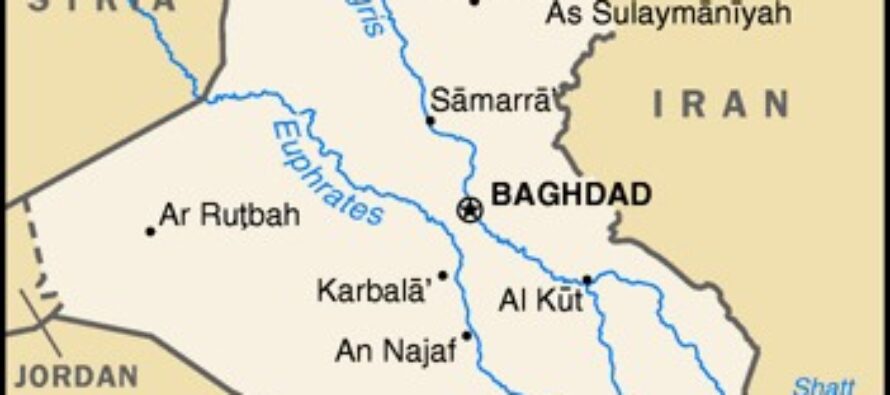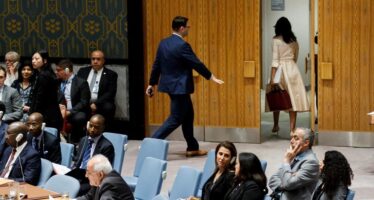Thousands of Iraqi detainees at risk of torture after US handover

![]()
Thousands of Iraqi detainees at risk of torture after US handover
Walid Yunis Ahmad has been held without charge or trial since 2000.
Tens of thousands of detainees held without trial in Iraq, many of whom were recently transferred from US custody, remain at risk of torture and other forms of ill-treatment, Amnesty International said in a new report launched on Monday.
New Order, Same Abuses: Unlawful detentions and torture in Iraq details thousands of arbitrary detentions, sometimes for several years without charge or trial, severe beatings of detainees, often in secret prisons, to obtain forced confessions, and enforced disappearances.
“Iraq’s security forces have been responsible for systematically violating detainees’ rights and they have been permitted to do so with impunity,” said Malcolm Smart, Amnesty International’s Director for the Middle East and North Africa.
“Yet, the US authorities, whose own record on detainees’ rights has been so poor, have now handed over thousands of people detained by US forces to face this catalogue of illegality, violence and abuse, abdicating any responsibility for their human rights.”
Amnesty International said it estimates that 30,000 detainees are held without trial in Iraq although the Iraqi authorities have failed to provide precise figures. Ten thousand of those were recently transferred from US custody as their combat troops ended some operations in Iraq.
Several detainees are known to have died in custody, apparently as a result of torture or other ill-treatment by Iraqi interrogators and prison guards, who regularly refuse to confirm their detention or whereabouts to relatives.
Riyadh Mohammad Saleh al-‘Uqaibi, 54 and married with children, died in custody on 12 or 13 February 2010, as a result of internal bleeding having been beaten so hard during interrogation that his ribs were broken and his liver damaged.
A former member of the Iraqi Special Forces, he was arrested in late September 2009 and held in a detention facility in the heavily-fortified Green Zone in Baghdad, before being transferred to a secret prison at the old Muthanna airport.
His body was handed over to his family several weeks later. The death certificate gave his cause of death as “heart failure”.
“The Iraqi authorities have signally failed to take effective action to stop torture and punish the perpetrators, despite overwhelming evidence of its use,” said Malcolm Smart.
“They have a duty to investigate, to hold perpetrators accountable and bring them to justice, and to provide reparation to the victims. The Iraqi authorities’ failure to take such concrete steps sends a message that such violations are tolerated and can be repeated.”
More than 400 detainees were held in the secret prison at the old Muthanna airport, whose existence was revealed publicly in April 2010.
Several of the detainees held there told Amnesty International they were detained on the basis of false information that Iraqi security forces obtained from secret informants.
They had been held without any access to the outside world and some were tortured or otherwise ill-treated during interrogation, apparently to make them confess to involvement in bombings or other crimes that could incur the death penalty.
Torture is widely used in Iraq to obtain “confessions”. In many cases these are already prepared by interrogators and detainees are forced to sign while blindfolded and without reading the contents.
Prepared confessions are often used as the only evidence against detainees when they are brought to trial, including in cases where the charges incur the death penalty.
Hundreds of prisoners are reported to have been sentenced to death, and some have been executed, after being convicted on the basis of “confessions” which they said were false and had been signed under torture or other duress.
Methods of torture include beating with cables and hosepipes, prolonged suspension by the limbs, administration of electric shocks to sensitive parts of the body, breaking of limbs, removal of finger and toenails, asphyxiation and piercing of the body with drills, and psychological torture such as threats of rape.
Thousands of people also continue to be detained despite judicial orders issued for their release, and a 2008 Iraqi Amnesty Law, which provides for the release of uncharged detainees after between six and twelve months.
The US forces completed the transfer of all but 200 prisoners to Iraqi custody on 15 July 2010 without any guarantees against torture or ill-treatment.
The report also highlights long term detentions in the northern Kurdistan region by the Asayish – Kurdish security police.
Walid Yunis Ahmad, 52 and a father of three, has been arbitrarily detained without charge or trial for more than 10 years since his arrest on 6 February 2000 in Erbil, capital of the semi-autonomous Kurdistan region of Iraq, by members of the Asayish. He is the longest held, untried detainee in Iraq known to Amnesty International.
Three years after his arrest his family discovered that he was alive but still detained and were able to visit him.
Walid Yunis Ahmad is alleged to have been tortured, and has been held in solitary confinement since going on a 45 day hunger strike in 2008 in protest at his continuing detention. He is currently still held at the Asayish headquarters in Erbil.
“The Iraqi authorities must take the firm and decisive action now, at the completion of the handover of prisons to Iraqi custody, to show that they have the political will to uphold the human rights of all Iraqis, in accordance with their international obligations, and to stop the torture and other gross abuses of detainees’ rights that are so prevalent today,” said Malcolm Smart.
“Detainees who have been held for long periods without recognizable criminal charges against them, and without having been tried, must be released or brought to trial promptly in full compliance with international standards of fair trial and without recourse to the death penalty.”
Related Articles
Nuestro Chávez y nuestros retos
![]()
Percy Francisco Alvarado Godoy Rebelión Le vi, flanqueado por Nicolás Maduro y Diosdado Cabello, sin suponer siquiera yo cuánto dolor
El gobierno de Piñera acentúa la militarización de las comunidades mapuche
![]()
Carlos Aznárez Resumen Latinoamericano Otra vez suenan tambores de guerra en la región mapuche del sur de Chile, más precisamente
Palestine. Brèves remarques concernant la décision récente de la Chambre Préliminaire de la CPI
![]()
Dans une décision très attendue rendue le 5 février 2021, la Chambre préliminaire de la Cour Pénale Internationale (CPI) a décidé que la CPI est pleinement compétente pour juger les exactions commises par Israël dans tous les territoires palestiniens, sans aucune exception



